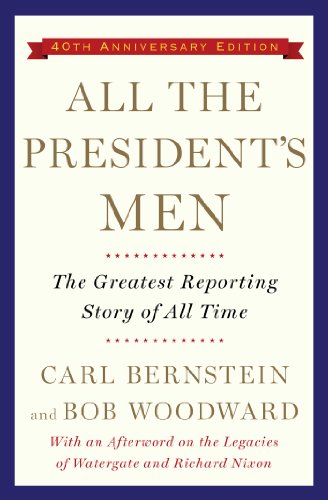This was my first time reading All the President’s Men. For those of you who read it twenty-five years or more ago, it warrants a second read. For those who have never read it, pick it up.
Written by Bob Woodward and Carl Bernstein, journalists for the Washington Post, it chronicles their development of the Watergate story from hotel break-in to the exposure of systemic fraud, deception, and illegal recording carried on by the Nixon administration. What started off as a story about a low-level burglary resulted in the resignation of the President of the United States.
Long before email and the internet, Woodward and Bernstein were knocking on doors and making phones calls. Though initially rivals at the Post, they eventually realized that they were stronger together. Bernstein was the better writer, Woodward had grit. Woodward’s clandestine relationship with his White House informant, Deep Throat, was spy novel worthy and proved to be paramount in the unraveling of the full story.
As the story was being developed, the White House issued repeated statements accusing the writers and the Post of false, biased reporting. They remained undeterred, though, and continued investigating and reporting. Through their relentless search for the truth, in the end, they got their men.
At the time of the book’s publication, some of the President’s men had pled guilty to crimes, many had resigned, and others were singing like birds. Less than two months after its publication, President Nixon resigned.
This book is full of facts, dates, and names so extensive that you cannot possibly keep it all straight. It reads like one long newspaper article and while sometimes tedious, it is fascinating. It is also at times barely believable, both in the lengths the reporters were willing to go to uncover the truth and the level of corruption that they exposed teeming through the Nixon administration.
Whatever side of the political aisle you’re on, this book supports the notion that this country has survived, and will continue to survive, times of severe political unrest which, while in the midst of it, might seem insurmountable. It also acts as a litmus test for how important our ‘free press’ was and is.
Published: 1975
Publisher: Simon & Schuster
Elizabeth's rating: 5 stars
